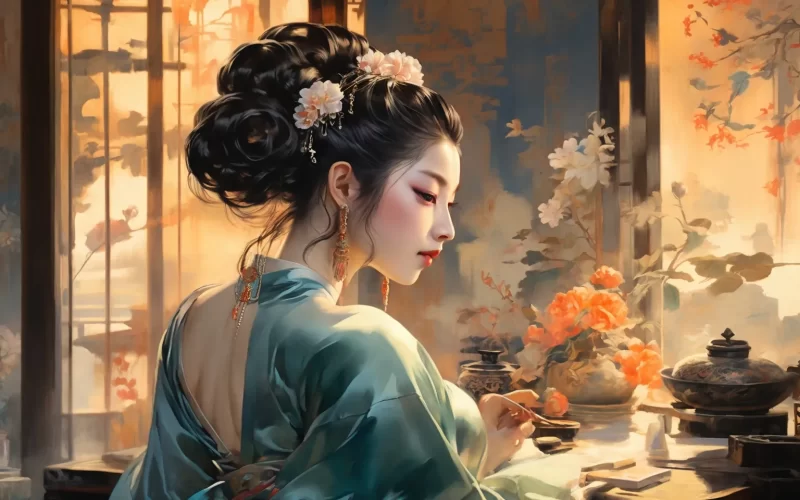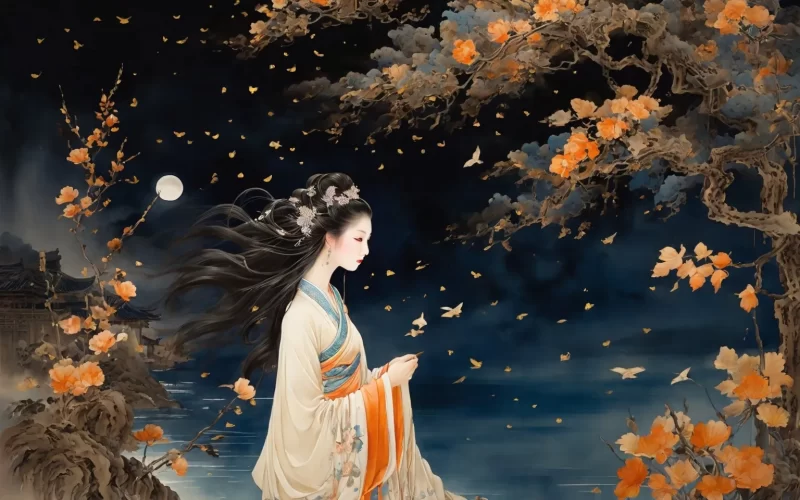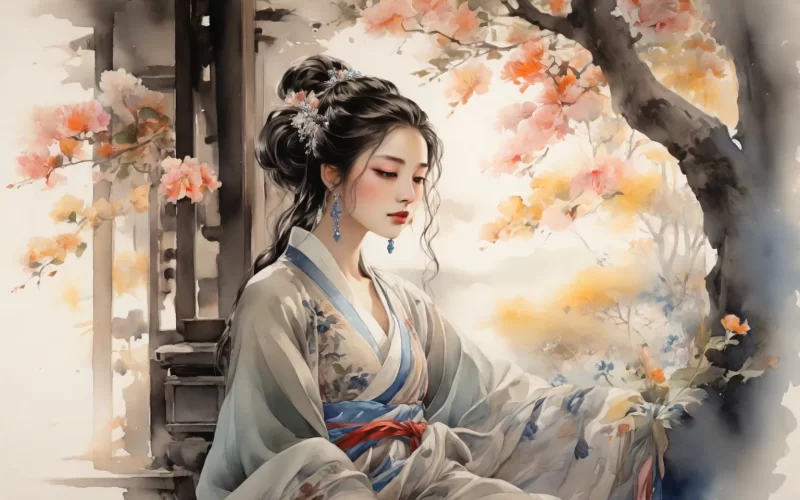In twelve chambers the ladies, decked for the day, Peer afar for their lord from their Fairy-View Lodge; The golden toad guards the lock on the door-chain, And the bronze-dragon water-clock drips through the mornmg - Till one of them, tilting a mirror, combs her cloud of hair And chooses new scent and a change of silk raiment; For she sees, between screen-panels, deep in the palace, Eunuchs in court-dress preparing a bed.
Original Poem
「宫词」
薛逢
十二楼中尽晓妆,望仙楼上望君王。
锁衔金兽连环冷,水滴铜龙昼漏长。
云髻罢梳还对镜,罗衣欲换更添香。
遥窥正殿帘开处,袍袴宫人扫御床。
Interpretation
This Tang masterpiece by Xue Feng unveils the psychological journey of a palace concubine—from morning preparations brimming with hope to evening's crushing disappointment. Through exquisite details of gesture, adornment, and environment, the poem exposes the emotional suffocation of imperial seclusion, achieving remarkable psychological depth in its portrayal of thwarted desire.
First Couplet: "十二楼中尽晓妆,望仙楼上望君王。"
Shí'èr lóu zhōng jìn xiǎo zhuāng, wàngxiān lóu shàng wàng jūnwáng.
In twelve-tiered towers, dawn finds all ladies powdered,
On Immortal-Viewing Terrace—gazing for the Son of Heaven.
The opening captures the collective ritual: "dawn makeup" (晓妆) applied like armor before the daily vigil. The redundant "gazing for the gazing" (望…望) structure mimics their obsessive scanning of horizons—hope stretched taut.
Second Couplet: "锁衔金兽连环冷,水滴铜龙昼漏长。"
Suǒ xián jīn shòu liánhuán lěng, shuǐ dī tóng lóng zhòu lòu cháng.
Gold-beast door rings hang icy as chains;
The copper dragon's water-clock drips daylight into eternity.
Here, inanimate objects articulate despair: the "icy" (冷) door fixtures mock warmth's absence, while the clock's "dripping" (滴) elongates time itself. These metallic images—beasts and dragons—cage the women in gilded barrenness.
Third Couplet: "云髻罢梳还对镜,罗衣欲换更添香。"
Yún jì bà shū hái duì jìng, luó yī yù huàn gèng tiān xiāng.
Cloud-chignon perfected—yet again she checks the mirror;
Silken robes changed—still more scent is dusted on.
Nervous energy thrums through these compulsive refinements. Each "again" (还) and "still more" (更) reveals desperation metastasizing into mania—the body made into a temple of futile worship.
Fourth Couplet: "遥窥正殿帘开处,袍袴宫人扫御床。"
Yáo kuī zhèngdiàn lián kāi chù, páo kù gōngrén sǎo yù chuáng.
Peering afar where the main hall's curtains part—
Robed eunuchs appear, smoothing the imperial bed's cold silk.
The climax delivers its knife-twist: the parted curtains (帘开处) promise nothing but servants "smoothing" (扫) an already-vacant bed. That final act of tidying up extinguishes hope with bureaucratic efficiency.
Holistic Appreciation
This Palace Poem vividly portrays a court lady's psychological journey—from anticipation to loneliness, persistence, and finally disappointment—through layered narration. With concise yet evocative language, the poet intertwines the character's external actions with her inner emotions, depicting the sorrowful plight of women trapped in the palace's hopeless waiting. The first two couplets emphasize the interplay between environment and mood, while the latter two focus on the progression of her thoughts and behavior, gradually unfolding a day's emotional odyssey. Meticulously structured and richly visual, the poem expresses both sympathy for the fate of imperial concubines under feudal systems and a nuanced portrayal of feminine tenderness and devotion.
Artistic Merits
The poem advances its narrative chronologically, with tight structure and clearly delineated emotional layers. The poet skillfully employs subtle details—"cold golden beast," "endless water clock," "adding incense," "peering from afar"—to construct an isolated, lonely, yet hopeful palace world. The language is elegant and understated, blending scene and sentiment seamlessly. Particularly striking is its psychological depth, allowing readers to keenly feel the emptiness and melancholy of "awaiting favor in vain."
Insights
Through delicate depiction and authentic emotion, this poem offers profound insight into the suppression of individual feelings and the helplessness of women's destinies under feudal systems. The court lady's daily hope reflects not only her longing for imperial grace but also her struggle against oblivion. Her loneliness, her obsession with self-adornment, and her ultimate disillusionment mirror a universal human experience—the desire to be seen and loved, yet exhausting one's passion in endless waiting. With compassionate insight, the poet exposes the cruelty of palace life while reminding modern readers to cherish emotional equality and individual dignity.
Poem translator
Kiang Kanghu
About the poet
Xue Feng (薛逢, c. 816–880), a native of Yongji, Shanxi, was a Late Tang poet. He attained the jinshi degree in 841 (the first year of the Huichang era) but suffered repeated demotions due to his unyielding pride in his literary talents. His poetic style resembles Li Shangyin's but is more vehement, with his seven-character regulated verse (qilü) demonstrating particular mastery. Amidst the ornate poetic trends of the Late Tang, Xue carved out a distinctive voice.












